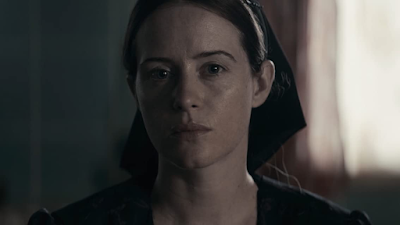There are many great films which are largely based on a dialogue contained in a single space. I've written about one of them very recently but the tradition goes back to the origins of Western literature, in the writings of Socrates and Plato and Xenophon. Those, of course, are about a protagonist (usually Socrates himself) leading a discussion about morals and ethics with other men. Women Talking abandons the sole protagonist and instead leads the discussion in a more democratic fashion, mostly among women. Like Lysistrata, a later drama in the Greek tradition, it is about women asserting their power in a society that largely oppresses them until they take a stand for their own well-being which is also for that society's well-being, above and beyond themselves. But it sticks to that original approach, and occasionally abandons drama for the sake of engaging the rhythm and intent of the dialogue and the discussion about rights, beliefs, identities, power and, overall, justice.
The story is rooted in the actual events that took place at the Manitoba Colony of Mennonites in Bolivia which inspired the novel by Miriam Toews upon which the film is based. Cow tranquilizer, serial rapists (of girls as young as three, as well as women), and the ultra-conservative religious and societal traditions of the Mennonites are all ingredients in the mix that creates a discussion of human rights that supersedes all of that and leaves the women questioning the basic human reactions to most crises: fight or flight. Or lay down and take it, which is the option that the majority rejects, leading to the dialogue about the upsides and downsides to the two realistic options. The ensuing discussion is intelligent, interesting, genuine, lively, and doesn't spare the emotion attached to words that bring doubt upon faith, confusion upon certainty, and determination amidst despair. It's an excellent example of a hard-fought argument that doesn't degenerate into a refusal to accept an opposing point of view or the violence that often follows that roadblock. Indeed, it's a great reminder of both the ability to agree to disagree on the basis of reason and intelligence, rather than ignorant refusal, and to change the minds of the most fervent believers into a recognition that the world is perhaps different than what they have always thought it to be. It is, of course, also a premier example of the most insidious and deprecating aspects of religion, which consigns people to being treated as if they had less value than property and to inhabiting a world of darkness even when they imagine they're surrounded by light. On the other hand, it's also an example of the higher aspects of deep belief in a moral code that shows how problems can be resolved without bloodshed and where peaceful refusal to accept the wrongs against you can be just as effective, if not moreso, than throwing down in the streets.
Among a host of great performances, Rooney Mara's stands above them. As the eminently reasonable Ona, she is one of the most intelligent voices in the room, but also one that demonstrates the ability to change one's outlook once enough of that reasonable discussion has passed. Accompanied by Claire Foy (Salome) and Jessie Buckley (Mariche), the two sides of raging anger who don't allow that emotion to overwhelm the solid basis for their perspectives, it creates a trio of analysts who propel what could have been a dry discussion of basic human rights into a story about the essential humanity of the people involved in this problem. Writer/director Sarah Polley developed these characters into roles that Mara, Foy, and Buckley had to climb into in order to present themselves as Mennonite women, confined by their culture and their determination to ascend to the kingdom of heaven, but whom also knew that they had to live as actual human beings in order to get there in the first place. As Salome points out: "Isn't there something worth living for in this life, not always the next?" Judith Ivey (Agata), Sheila McCarthy (Greta), and Kate Hallett (Autje) also give excellent support to that trio. I have to single out Hallett, who does an excellent job in her acting debut, to present a younger viewpoint on the whole situation, ranging from boredom and distraction, to righteous anger and stubbornness, to mature recognition that she's acting not only for her own interests and safety, but for the women who've been suffering this abuse for years before she was even born. It was also interesting to see Frances McDormand in a very tiny role which had me questioning why she was willing to do it, until I discovered in the end credits that she was the producer of the film. It seemed like she was willing to put her muscle behind it and then step back to let these other stars carry the show.
In the end, I walked away from it thinking that every choice that Polley had made was smart and that makes for a great film. Not least among those choices was getting Hildur Guðnadóttir to do the score, as she's been a favorite since Chernobyl and her music, while quite restrained, still conveyed exactly the level of intensity that was needed. The quiet piano as Mariche entered her house for one last night in the same space as her abusive husband, Klaus, was chilling, just as it should've been. There are some who might think that a bit more action and less talking might have led to a more effective bit of storytelling, rather than hitting the audience over the head with the points the script was making. But I found the discussion to be so smart(!) and fascinating that there were more than enough action and emotion to deliver exactly the story that needed to be told. Highly recommended, especially for the men who tend to sustain the kind of culture that the story is exposing and questioning in true Socratic fashion.















